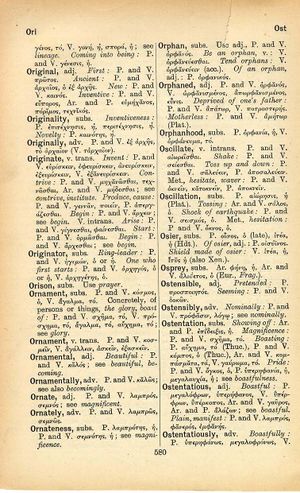ornate: Difference between revisions
τὸ ἓν καὶ τὸ ὂν πολλαχῶς λέγεται → the term being and the term one are used in many ways, one and being have various meanings, one and being have many senses
m (Text replacement - "link={{" to "link={{") |
m (Text replacement - "}}]]" to "}}]]") |
||
| Line 1: | Line 1: | ||
{{Woodhouse1 | {{Woodhouse1 | ||
|Text=[[File:woodhouse_580.jpg|thumb | |Text=[[File:woodhouse_580.jpg|thumb | ||
|link={{filepath:woodhouse_580.jpg | |link={{filepath:woodhouse_580.jpg}}]]'''adj.''' | ||
P. and V. [[λαμπρός]], [[σεμνός]]; see [[magnificent]]. | P. and V. [[λαμπρός]], [[σεμνός]]; see [[magnificent]]. | ||
}} | }} | ||
Revision as of 10:11, 15 August 2017
English > Greek (Woodhouse)
adj.
P. and V. λαμπρός, σεμνός; see magnificent.
Latin > English (Lewis & Short)
ornātē: adv., v. orno,
I P. a. fin.
Latin > French (Gaffiot 2016)
ōrnātē¹² (ornatus), d’une manière ornée, avec élégance : Cic. de Or. 3, 53 ; Or. 22 ; ornatissime defendere causam, Cic. Br. 21, défendre une cause dans le style le plus orné, le plus élégant ; -tius Cic. de Or. 2, 35 ; Ac. 2, 129.
Latin > German (Georges)
ōrnātē, Adv. m. Compar. u. Superl. (1. ornatus), zierlich, mit Geschmack, geschmackvoll, facere, herrlich, Cic.: comparare magnifice et ornate convivium, Cic. – bes. als rhet. t. t., orn. loqui, dicere, Cic.: causas agere ornatius, Cic.: causam ornatissume et copiosissume defendere, Cic. Brut 21.

